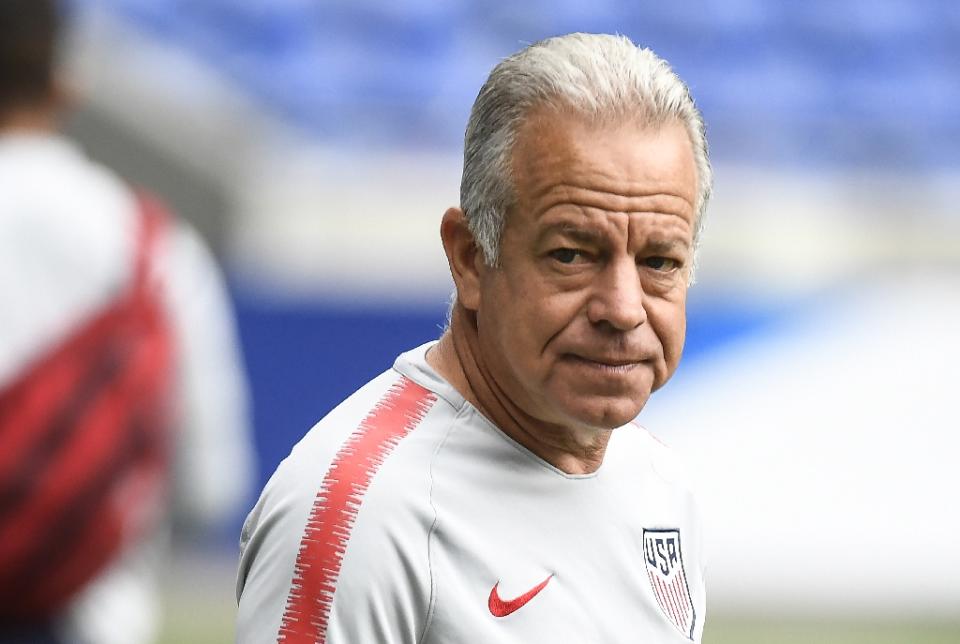How interim coach Dave Sarachan earned the trust of the USMNT's next generation

It remains to be seen if Tuesday’s friendly match between the United States men’s national team and Peru will be the last for acting U.S. coach Dave Sarachan. With USMNT general manager Earnie Stewart hoping to name a permanent manager by the end of October, it sure seems possible.
It’s also possible that Sarachan will stay on through the final two matches of 2018 against England and Italy next month, even if a new coach is named before then. Such is the reality of existing contracts; Stewart himself stayed in his role with the Philadelphia Union for almost two months after taking the GM job.
What’s clear is this: U.S. fans and even players are eager for the inevitable change. Sarachan was never expected to be the long-term solution. He was elevated to the helm from his role as an assistant only after Bruce Arena resigned days after the spectacular failure to qualify for the 2018 World Cup. Yet over the last year, Sarachan, almost by accident, has proven to have the ideal personality to lead the USMNT’s next generation though the darkest time in program history.
“Going into it, nobody knew exactly what to expect because it was an unprecedented time for U.S. Soccer,” midfielder Wil Trapp told Yahoo Sports in a recent interview. “But the fatherly type culture Dave creates is perfect for a young group that is inexperienced but hungry, passionate and aggressive. He’s been amazing in terms of how he’s brought us along game by game, camp by camp.”
Sarachan has given 19 players – including a record five teenagers – their international debuts over the last 11 months. Perhaps as important, his easygoing and nurturing personality has gone a long way toward helping those players to feel comfortable from the start.
“He’s so down to earth, which makes it nice for a young player coming in who might be a little bit nervous,” said 19-year-old Tyler Adams, who was originally named to the current roster before withdrawing because of a back injury. “On the field he’s going to push you, but it’s easier to settle down with a coach who’s very relaxed.”
Adams didn’t know Sarachan at all when he was called in for the USMNT’s first game after the qualifying debacle, at European champion Portugal last November. But he had heard only good things from Jesse Marsch, then his coach with the New York Red Bulls, and Marsch’s then-deputy Chris Armas, both of whom played for Sarachan’s Chicago Fire teams in the early to mid 2000s.

“Every time I talked to Chris or Jesse about Dave, they told me he’s a great guy, a great coach,” Adams said. “Within our Red Bull organization, we talk about how having great people will reflect on the field because you want to play for them.
“Off the field, I can have a normal conversation with Dave about anything,” continued Adams. I can talk to him about girls, whatever. It’s amazing to have a coach like that. Once we’re on the field it’s all about work and representing our country in the right way, but off the field he lets us have our downtime. He’s found the right mix. Because I’m with a coach who I can have a good relationship with very easily, I feel like my integration progress has been seamless into the team.”
From the start, Sarachan knew his role. While a younger coach hoping to earn the long-term appointment might have used a firmer hand or prioritized short-term results over blooding fresh talent, he stuck to his plan. He leaned on the experience of being Arena’s assistant during the program’s finest hour, when the U.S. reached the quarterfinals of the 2002 World Cup. And he has picked up some impressive results along the way.
There was the tie against Portugal and, in June, another at eventual World Cup champion France. A win over rival Mexico on Sept. 11. And for the most part, Sarachan has done it with an insanely young roster that has consistently averaged less than 24 years old.
“I didn’t take this [job] with the idea of thinking what’s it going to be like in a year or two,” Sarachan admitted during Monday’s pre-match press conference. “But now that a year is over, there’s a body of work there that I feel very proud of.”
It almost certainly won’t be enough to land him the permanent gig, nor should it. This new group of players now appears ready for a more tactically accomplished coach who can lead them toward Qatar 2022. But Sarachan deserves a ton of credit for being the bridge between failure and the future. Maybe it even puts him in the conversation to lead the U.S. under-23 squad, which is hoping to qualify for the Olympics for the first time since 2008.
“In terms of the indecision, the unknown of what’s going to happen, he could’ve mailed it in and he hasn’t done that at all,” Trapp said of Sarachan. “He’s done a really good job of making these games special for players, understanding that there’s a lot to be gained from them.”
Doug McIntyre covers soccer for Yahoo Sports. Follow him on Twitter @ByDougMcIntyre.
More soccer on Yahoo Sports:
• Sterling scores twice as England wins in Spain for the first time in 31 years
• Hard to know what to make of USMNT right now
• Takeaways from the U.S. friendly loss to Colombia
• United States, Mexico learn 2019 Gold Cup destinations

